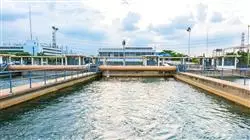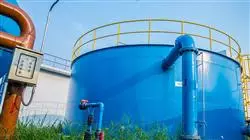University certificate
The world's largest faculty of engineering”
Introduction to the Program
A comprehensive and multidisciplinary program that will allow you to excel in your career, following the latest advances in Wastewater Treatment"

The purpose of a Wastewater Treatment plant (WWTP) is to remove pollutants from wastewater in order to return the water to its source without the presence of pollutants. Among the most frequent contaminants are oils, greases, sands, settleable solids, ammonia and phosphorus compounds.
After passing through the WWTP and as in any chemical process, a product is obtained which is the decontaminated water and a by-product which is the stable sludge as a result of the operations carried out.
The course is focused on the study of the processes and equipment associated with a Wastewater Treatment plant from a chemical engineering point of view. First, a description of the chemical contaminants is given and the methodology for sample collection is discussed. Secondly, the processes carried out in a WWTP are studied in depth, differentiating between pretreatment, primary, secondary and tertiary treatment. Thirdly, the sludge obtained in a WWTP, its treatment and its use in the form of biogas are studied. Finally, low-cost purification technologies, such as lagooning or green filtering, among others, will be studied.
After completing this training, the student will be able to identify and understand the physicochemical processes of a Wastewater Treatment plant, as well as to design the equipment of a WWTP.
It should be noted that as this is a 100% online course, the student is not conditioned by fixed schedules or the need to move to another physical location, but can access the contents at any time of the day, balancing their work or personal life with their academic life.
Don't miss the opportunity to take this Wastewater Treatment Course with us. It's the perfect opportunity to advance your career"
This Postgraduate certificate in Wastewater Treatment contains the most complete and up to date educational program on the market. The most important features of the program include:
- The development of case studies presented by Wastewater Treatment experts
- The graphic, schematic, and eminently practical contents with which they are created, provide scientific and practical information on the disciplines that are essential for professional practice
- Practical exercises where the self-assessment process can be carried out to improve learning
- Special focus on innovative methodologies in Wastewater Treatment
- Theoretical lessons, questions to the expert, debate forums on controversial topics, and individual reflection assignments
- Access to content from any fixed or portable device with an Internet connection
This course is the best investment you can make in selecting a refresher program to bring your Wastewater Treatment knowledge up to date"
Its teaching staff includes professionals from the field of waste management, who contribute their work experience to this training program, in addition to renowned specialists from leading companies and prestigious universities.
The multimedia content, developed with the latest educational technology, will provide the professional with situated and contextual learning, i.e., a simulated environment that will provide immersive training programmed to train in real situations.
This program is designed around Problem Based Learning, whereby the professional must try to solve the different professional practice situations that arise during the academic year. For this purpose, the professional will be assisted by an innovative interactive video system created by renowned and experienced Wastewater Treatment experts.
This training is provided with the best didactic material, which will allow for a contextual study that will facilitate your learning.

This 100% online course will allow you to combine your studies with your professional work. You choose where and when to train"
Why study at TECH?
TECH is the world’s largest online university. With an impressive catalog of more than 14,000 university programs available in 11 languages, it is positioned as a leader in employability, with a 99% job placement rate. In addition, it relies on an enormous faculty of more than 6,000 professors of the highest international renown.

Study at the world's largest online university and guarantee your professional success. The future starts at TECH”
The world’s best online university according to FORBES
The prestigious Forbes magazine, specialized in business and finance, has highlighted TECH as “the world's best online university” This is what they have recently stated in an article in their digital edition in which they echo the success story of this institution, “thanks to the academic offer it provides, the selection of its teaching staff, and an innovative learning method aimed at educating the professionals of the future”
A revolutionary study method, a cutting-edge faculty and a practical focus: the key to TECH's success.
The most complete study plans on the university scene
TECH offers the most complete study plans on the university scene, with syllabuses that cover fundamental concepts and, at the same time, the main scientific advances in their specific scientific areas. In addition, these programs are continuously being updated to guarantee students the academic vanguard and the most in-demand professional skills. In this way, the university's qualifications provide its graduates with a significant advantage to propel their careers to success.
TECH offers the most comprehensive and intensive study plans on the current university scene.
A world-class teaching staff
TECH's teaching staff is made up of more than 6,000 professors with the highest international recognition. Professors, researchers and top executives of multinational companies, including Isaiah Covington, performance coach of the Boston Celtics; Magda Romanska, principal investigator at Harvard MetaLAB; Ignacio Wistumba, chairman of the department of translational molecular pathology at MD Anderson Cancer Center; and D.W. Pine, creative director of TIME magazine, among others.
Internationally renowned experts, specialized in different branches of Health, Technology, Communication and Business, form part of the TECH faculty.
A unique learning method
TECH is the first university to use Relearning in all its programs. It is the best online learning methodology, accredited with international teaching quality certifications, provided by prestigious educational agencies. In addition, this disruptive educational model is complemented with the “Case Method”, thereby setting up a unique online teaching strategy. Innovative teaching resources are also implemented, including detailed videos, infographics and interactive summaries.
TECH combines Relearning and the Case Method in all its university programs to guarantee excellent theoretical and practical learning, studying whenever and wherever you want.
The world's largest online university
TECH is the world’s largest online university. We are the largest educational institution, with the best and widest online educational catalog, one hundred percent online and covering the vast majority of areas of knowledge. We offer a large selection of our own degrees and accredited online undergraduate and postgraduate degrees. In total, more than 14,000 university degrees, in eleven different languages, make us the largest educational largest in the world.
TECH has the world's most extensive catalog of academic and official programs, available in more than 11 languages.
Google Premier Partner
The American technology giant has awarded TECH the Google Google Premier Partner badge. This award, which is only available to 3% of the world's companies, highlights the efficient, flexible and tailored experience that this university provides to students. The recognition as a Google Premier Partner not only accredits the maximum rigor, performance and investment in TECH's digital infrastructures, but also places this university as one of the world's leading technology companies.
Google has positioned TECH in the top 3% of the world's most important technology companies by awarding it its Google Premier Partner badge.
The official online university of the NBA
TECH is the official online university of the NBA. Thanks to our agreement with the biggest league in basketball, we offer our students exclusive university programs, as well as a wide variety of educational resources focused on the business of the league and other areas of the sports industry. Each program is made up of a uniquely designed syllabus and features exceptional guest hosts: professionals with a distinguished sports background who will offer their expertise on the most relevant topics.
TECH has been selected by the NBA, the world's top basketball league, as its official online university.
The top-rated university by its students
Students have positioned TECH as the world's top-rated university on the main review websites, with a highest rating of 4.9 out of 5, obtained from more than 1,000 reviews. These results consolidate TECH as the benchmark university institution at an international level, reflecting the excellence and positive impact of its educational model.” reflecting the excellence and positive impact of its educational model.”
TECH is the world’s top-rated university by its students.
Leaders in employability
TECH has managed to become the leading university in employability. 99% of its students obtain jobs in the academic field they have studied, within one year of completing any of the university's programs. A similar number achieve immediate career enhancement. All this thanks to a study methodology that bases its effectiveness on the acquisition of practical skills, which are absolutely necessary for professional development.
99% of TECH graduates find a job within a year of completing their studies.
Postgraduate Certificate in Wastewater Treatment
At the Faculty of Engineering of TECH Global University, the largest Spanish-speaking university in the world, we offer engineers an attractive Postgraduate Certificate in Wastewater Treatment with the aim of studying the processes and equipment associated with a Wastewater Treatment Plant (WWTP), from the chemical point of view (removal of pollutants: oils, greases, sands, settleable solids, ammonia and phosphorus compounds). In addition, it goes into the purification stages (pre-treatment and primary, secondary and tertiary treatment) and the obtaining of sludge for use as biogas.
The best Postgraduate Certificate in wastewater treatment
Addressing the relationship between water and the environment is a responsibility, to a greater extent, of professional engineering graduates. Hence, a specialized education, such as this TECH Postgraduate Certificate, is a unique alternative to update the engineer's knowledge. In this sense, students who access our program will be able to identify and apply concepts related to physicochemical processes of water, pollution parameters, sedimentation, biofilters, nitrogen removal, pH regulation, sludge treatment, low cost purification technologies, septic tanks, among other topics.







